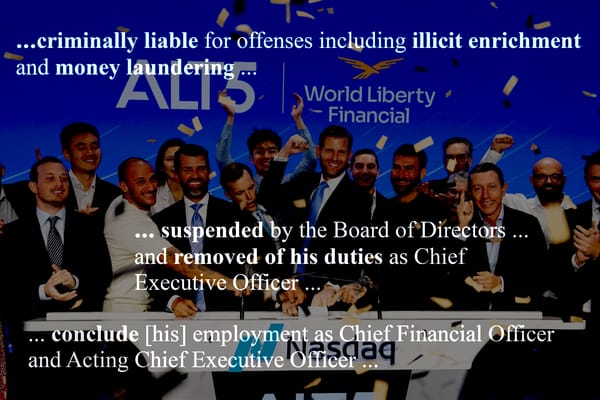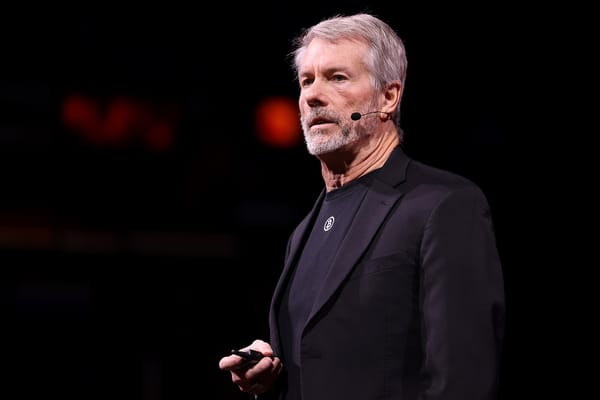Elon Musk and the right’s war on Wikipedia
The world's richest man has joined a growing chorus of right-wing voices attacking Wikipedia as part of an intensifying campaign against free and open access information.
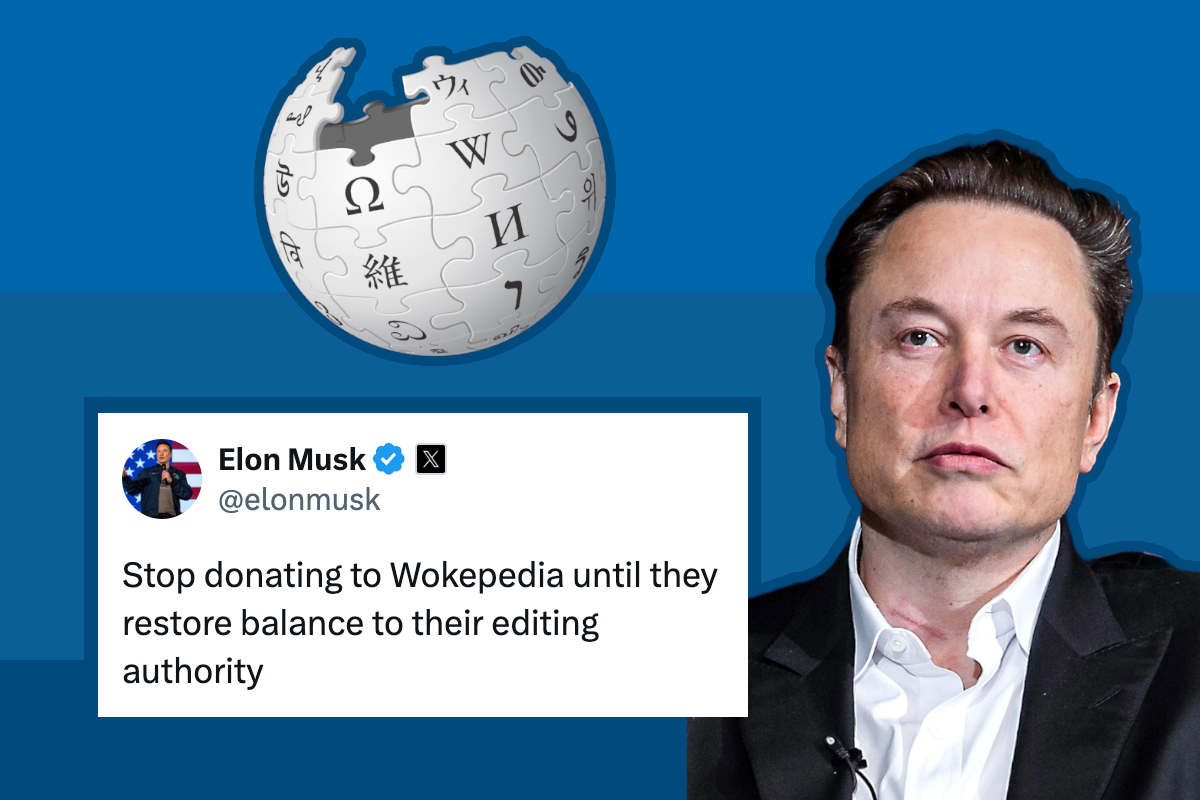
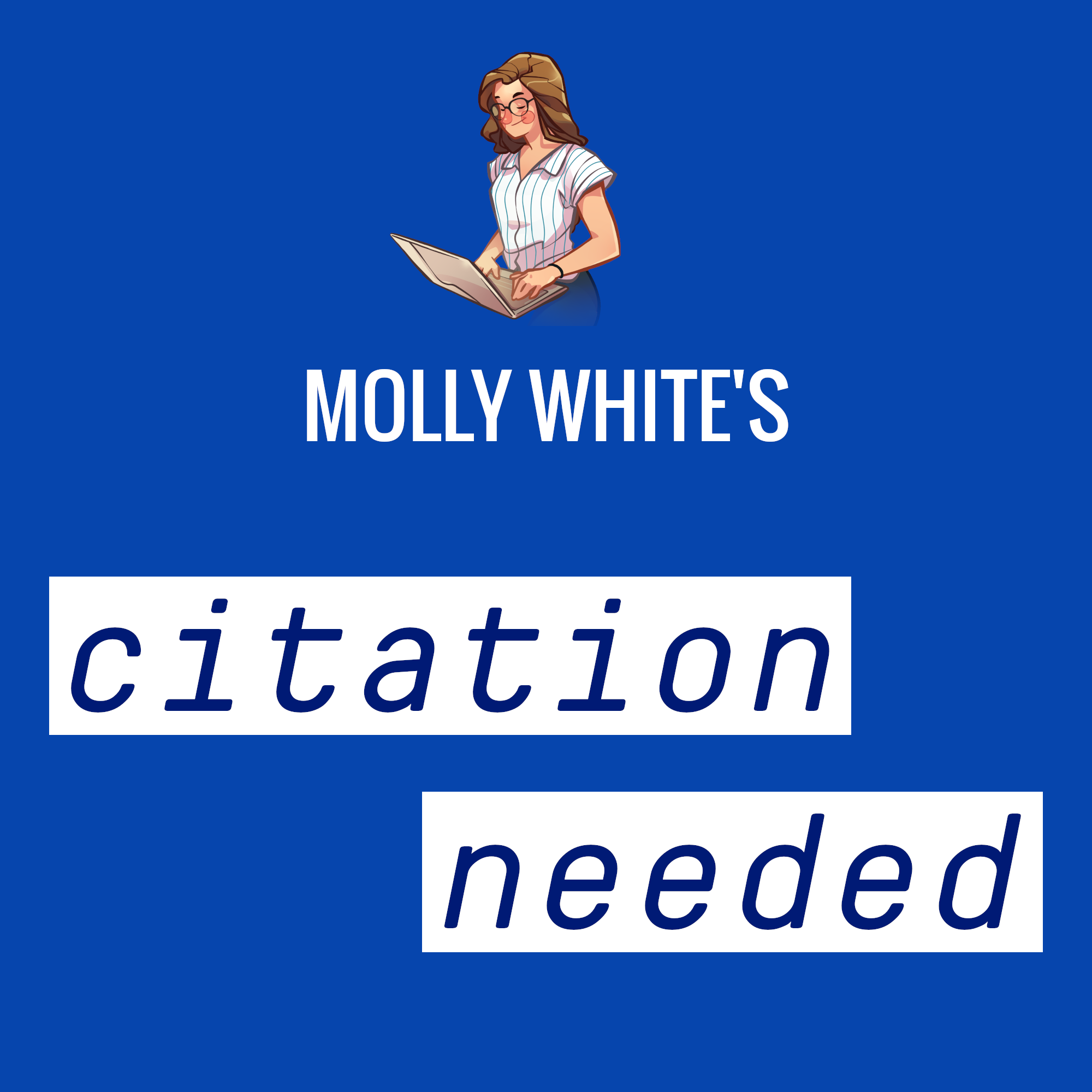
When Elon Musk launched his latest crusade against Wikipedia this Christmas Eve, it wasn’t just another of the billionaire’s frequent Twitter tantrums. His gripes about the community-written encyclopedia expose something far more significant: the growing efforts by America’s most powerful right-wing figures to rewrite and control the flow of information. While Musk’s involvement began with grievances about his own coverage on the website, his recent attacks reveal his growing role in this broader campaign to delegitimize Wikipedia, and the right’s frustration with platforms that remain resilient against such control.
“Stop donating to Wokepedia,” Elon Musk urged in a tweet sent in the early hours of December 24. This was only the opening shot: over the following week, the world’s richest man and the United States’ new unelected First Buddy unleashed a barrage of attacks aimed at convincing his 200 million Twitter followers to boycott the Wikimedia Foundation, the non-profit supporting the volunteer-maintained Wikipedia project. While Musk’s grudge against Wikipedia stretches back years, his latest campaign borrowed its arguments entirely from fellow travelers in the far-right conspiracy theory swamp he increasingly calls home.
First was Chaya Raichik, also known as “Libs of TikTok,” who on December 23 screenshotted a pie chart of budget categories from the Wikimedia Foundation’s 2023–2024 annual plan.1 Apparently not bothering to read past the labels, Raichik dashed off a tweet condemning the Foundation for spending $50 million on “diversity, equity, and inclusion”,a the right’s latest bogeyman, and urging her own substantial follower base to “Stop donating to Wokepedia”.2b Musk agreed, amplifying her post with the comment: “Stop donating to Wokepedia until they restore balance to their editing authority.”3
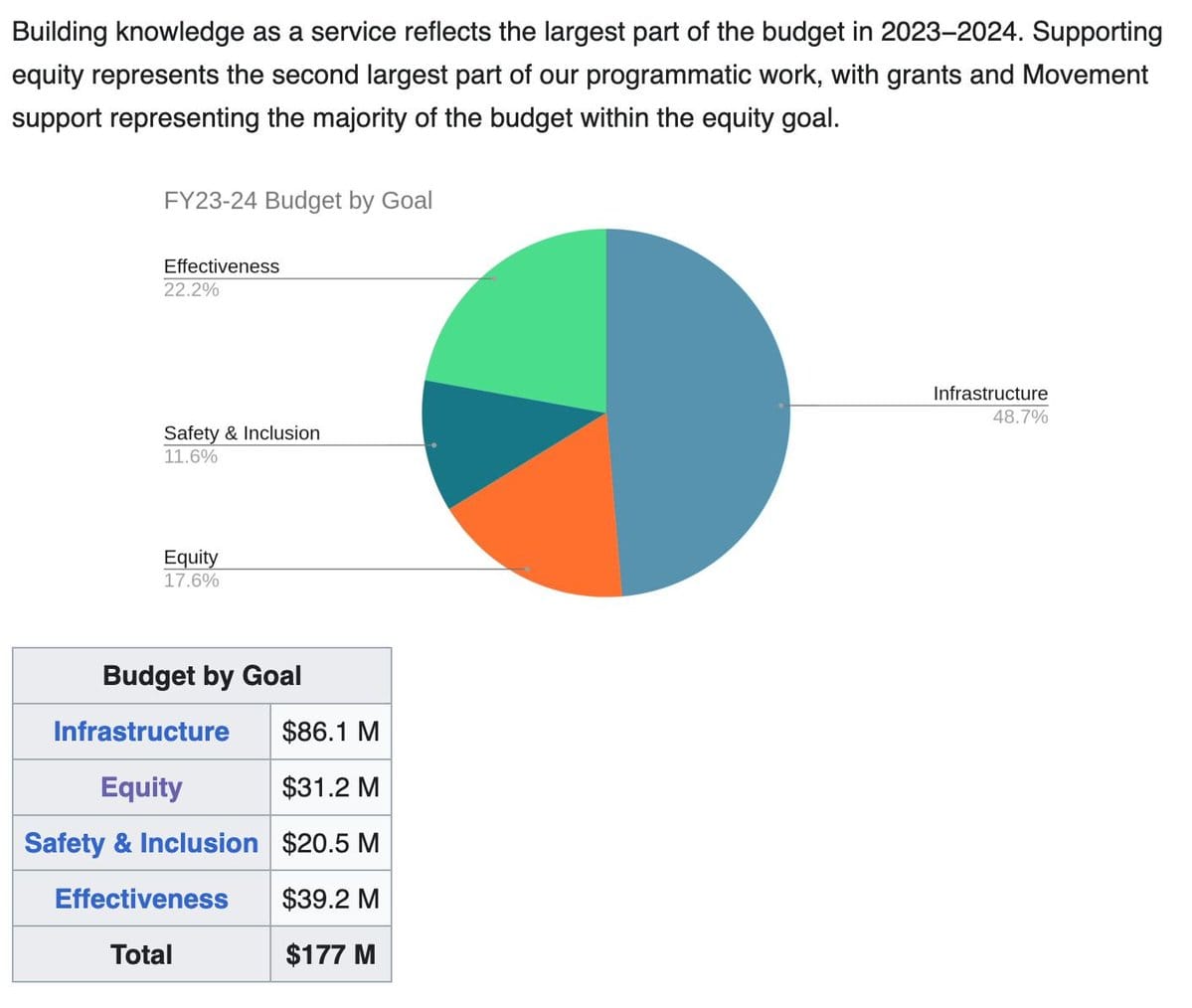
Two days later, Musk retweeted Mario Nawfal, who had ripped off Raichik’s same post to produce his own, with the bold and all-caps headline “Wikipedia blows $50M on wokeness”. Nawfal added, “That’s $50 million for DEI instead of, you know, improving the actual site. … Sure, inclusion is nice, but maybe they could use some of that money to ensure they’re a reliable source of information first? Just a thought.”4
What Nawfal, Raichik, and Musk either failed to understand or deliberately misrepresented was that these budget categories they’ve dismissed as “DEI” directly support Wikipedia’s reliability. The funding goes to programs to expand coverage of underrepresented topics, recruit editors with expertise in neglected subject areas, develop tools to identify and counter coordinated disinformation campaigns, improve article and source reliability, and protect the project and its editors from attempts to censor or restrict access to Wikipedia content. Far from detracting from Wikipedia’s mission, these programs work to directly address the types of concerns Musk and others raise.5
Then, in the early hours of December 31, Musk reposted a video from a self-described “Conspiracy Realist/Coincidence analyser” account, “@BGatesIsaPsycho”, which had in turn taken the video from antisemitic conspiracy theoristc and self-described “OSINT journalis[t] exposing globalism” Ian Carroll. “No more donations to Wikipedia until they start being truthful”, Musk added, atop a video where Carroll claimed that “someone deleted all of Bill Clinton’s connections to Jeffrey Epstein from Wikipedia”, suggesting that Clinton himself was behind the edits. This, again, was a complete misrepresentation: the text was moved, not deleted, and not likely by Bill Clinton.d If Carroll had cared to look at the public article editing history, he would have seen that the extremely long biographical article on Clinton was in fact split678 — as overlong articles often are9 — into separate subtopic articles, “Bill Clinton sexual assault and misconduct allegations” and “Post-presidency of Bill Clinton”, both of which are linked from the primary page. The Epstein-related section was restored to the primary Clinton article by a different editor three weeks later,10 shortly after Carroll published his video but months before Musk reshared it.
Musk followed up the Epstein video retweet, two hours later, with a retweet of a video from an account called “End Wokeness”, which is possibly run by white nationalist Jack Posobiec.11 The video was a clip from a three-year-old interview by The Epoch Times with Larry Sanger, a jilted co-founder of Wikipedia who left about a year after its creation, who has created a string of failed Wikipedia competitors in the more than twenty years since. Sanger’s original complaints were about Wikipedia’s whole ethos, namely that the project doesn’t limit editing to subject-matter experts or other authority figures.e However, over the last five to ten years his grievances have shifted, and Sanger now mostly complains that Wikipedia has become “leftist propaganda” — primarily due to his concerns that Wikipedia articles don’t cite right-leaning publications like Fox News or The Daily Mail as much has he believes they ought. This axe-grinding, paired with the appeal to authority in his co-founder title, has earned him airtime on the right-wing media circuit, including on Tucker Carlson and elsewhere on Fox News, Christopher Rufo’s Substack, and generally in the same places he’s complained are not considered sufficiently reliable for Wikipedia.f
Musk’s recent Twitter rampage reveals a man with a grudge against Wikipedia, looking for anything to support his position, regardless of accuracy. While Musk once spoke reverently of Wikipedia, you have to dig back years to find it.
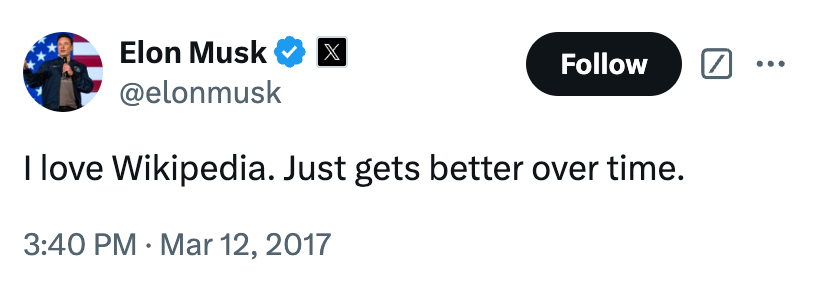

His more recent mentions of the site include multiple direct appeals to founder and current WMF board member Jimmy Wales, beginning in 2022, to complain that the site is “losing its objectivity”,12 is “overly controlled by mainstream media”,13 and “has a non-trivial left-wing bias”.14 He’s bashed the site at least ten times since then as “Wokepedia”15 and lamented its “capture” by the “woke mind virus”.16 His requests that people not donate to the Wikimedia Foundation date back at least a year.17
But why have Musk and others on the right chosen Wikipedia as a favorite punching bag?
Control
The rise of the MAGA right in the United States has sparked some startling changes in attitudes towards press freedom and freedom of expression. Although many on the right, including Musk,1819 have styled themselves as valiant defenders of free speech, their actions expose them as opposite: only willing to defend speech they find agreeable, while hostile towards and desperate to clamp down on criticism or opposing views. Musk, for example, has directed that “cisgender” be blocklisted on Twitter as a “slur”, and posts by most accounts that contain the word are automatically hidden from view (unlike posts containing the long list of slurs he has apparently deemed acceptable).20 He has brought SLAPP lawsuits against critics, including one dismissed by a federal judge as clearly intended to “punish [the nonprofit Center for Countering Digital Hate] for CCDH publications that criticized X Corp. [Twitter] — and perhaps in order to dissuade others who might wish to engage in such criticism.”21 He spent $44 billion to acquire Twitter, ostensibly over concerns that conservative voices were being unfairly silenced, but really so that he could be the one to dictate which speech was and was not allowed on the platform.
Similar attacks on speech are becoming only more common throughout the American right, with president-elect Trump’s longstanding hostility to the media escalating at a rapid clip. In recent months, Trump has suggested he wouldn’t mind if reporters were shot,22 threatened to jail journalists, editors, and publishers who refuse to reveal confidential sources, threatened to investigate or pull broadcasting licenses for news organizations that reported on him unflatteringly,23 and filed SLAPP suits of his own against news publications and pollsters.24
This hostility to information sources outside their control extends far beyond the media. Right-wing groups have launched coordinated campaigns to ban books from schools and libraries, particularly those discussing race, gender, or LGBT topics.25 They’ve pushed legislation like the “Kids Online Safety Act” that, while framed as protecting children, would require platforms to restrict access to information deemed “harmful” or “inappropriate for minors”, which is likely to include resources for LGBT youth and information about reproductive or gender-affirming healthcare, sexual education, or mental health.26 And they’ve supported state-level laws requiring internet platforms to implement age restrictions that threaten privacy and are vulnerable to weaponization against content deemed “obscene”.27 The common thread connecting these efforts is not protecting children or promoting “family values,” but controlling what information people can access.
But neither Trump, Musk, nor anyone on the right can control Wikipedia as they wish. A 2022 tweet from a New York Post reporter, musing about how much Musk would have to spend to buy Wikipedia, was met with a clear rebuke from Jimmy Wales: “Not for sale.”28 The site later echoed the sentiment in its fundraising appeals, nodding at the idea that Musk should just “buy Wikipedia” like he did with Twitter when it reassured potential donors that “there is no danger that someone will buy Wikipedia and turn it into their personal playground.”
Attempts to coerce changes to Wikipedia’s content via the legal system would likely fall flatter than lawsuits Musk and his ilk have threatened or filed against critics, because the Wikimedia Foundation has proven itself remarkably willing to fight back against formidable adversaries. In 2017, the Wikimedia Foundation denied Turkey’s attempts to force the site to alter information about the Turkish government’s support for terrorist organizations. When Turkey blocked Wikipedia access in response, the Foundation took the case to the Turkish supreme court, and access was restored in January 2020 after the court ruled the ban violated human rights to freedom of expression. The Foundation has likewise resisted threats from the United States, refusing to submit to legal threats from the FBI in 2010 after they demanded Wikipedia stop using an image of the FBI seal,29 and in 2015 filing suit against the NSA over its upstream mass surveillance program, kicking off a years-long legal battle with the agency (which was eventually decided in favor of the NSA).
This isn't to say Wikipedia is impervious to influence. While obvious vandalism and heavy-handed manipulation attempts typically fail quickly, more subtle influence campaigns can succeed, at least for a time, by working within Wikipedia's rules and social dynamics. Coordinated editing campaigns have sometimes pushed biased content, particularly in areas of the project that attract less attention. Governments have been accused of attempting to manipulate Wikipedia to favor their interests or spread propaganda, while paid editing firms have manipulated articles about corporations and politicians. But Wikipedia's transparency makes manipulation visible and correctable: every edit is publicly logged, discussed, and reversible. And a decree by a government or billionaire does not ultimately determine what content stays or goes.
While some news outlets and other entities have proven willing to back down in the face of threats and demands from powerful figures (or has lacked the resources to do anything but), Wikipedia has not. This resilience against control helps explain why figures like Musk find Wikipedia so infuriating. They can buy platforms, threaten lawsuits, or pressure advertisers, but they cannot simply purchase or coerce control over Wikipedia.
Source reliability
A common complaint from Larry Sanger and others on the right has been Wikipedia's supposed “banning” of right-leaning sources. The reality is more complex: Wikipedia’s source reliability guidelines focus on accuracy and editorial practices, not political alignment. For instance, when the Daily Mail was deprecated as a source in 2017, it wasn’t because of its right-wing stance, but because of documented cases where it published false stories without correction, fabricated quotes, and manipulated images.30 Meanwhile, right-leaning publications with stronger fact-checking practices, like The Wall Street Journal and The Telegraph, remain widely used across Wikipedia.
These nuances often get lost in politically-charged discussions about Wikipedia source reliability. Take the case of Fox News: while its opinion programming is generally considered unreliable due to numerous documented falsehoods, its straight news reporting is often deemed acceptable for topics outside of politics and science. Similarly, while the New York Post is considered unreliable for political coverage due to its tabloid approach and history of fabrications, it’s still sometimes used for entertainment coverage.
To reduce repetitive conversations about commonly cited sources, Wikipedia maintains a list of “perennial sources” — publications that are frequently used, and whose reliability is a recurring topic of time-consuming discussions about source usability.g The list segments publications from “generally reliable in its areas of expertise” to “generally unreliable” (use is normally not acceptable) or, more rarely, “deprecated” (use is rarely acceptable). However, source reliability is still taken case-by-case on Wikipedia, depending heavily on not just the publisher and its editorial practices, but also the statements a citation is intended to support, and the specifics of the article being cited. There are articles published in “generally reliable” publications that shouldn’t be used as sources on Wikipedia, and there are articles published in “generally unreliable” or even “deprecated” publications that are reasonably used as sources.
This controversial page documenting the general view of reliability for some popular publications is anything but the canonical list of “approved” or “banned” sources many of its critics claim it to be. Whether a source is usable on Wikipedia is a case-by-case decision, as the page itself makes clear:
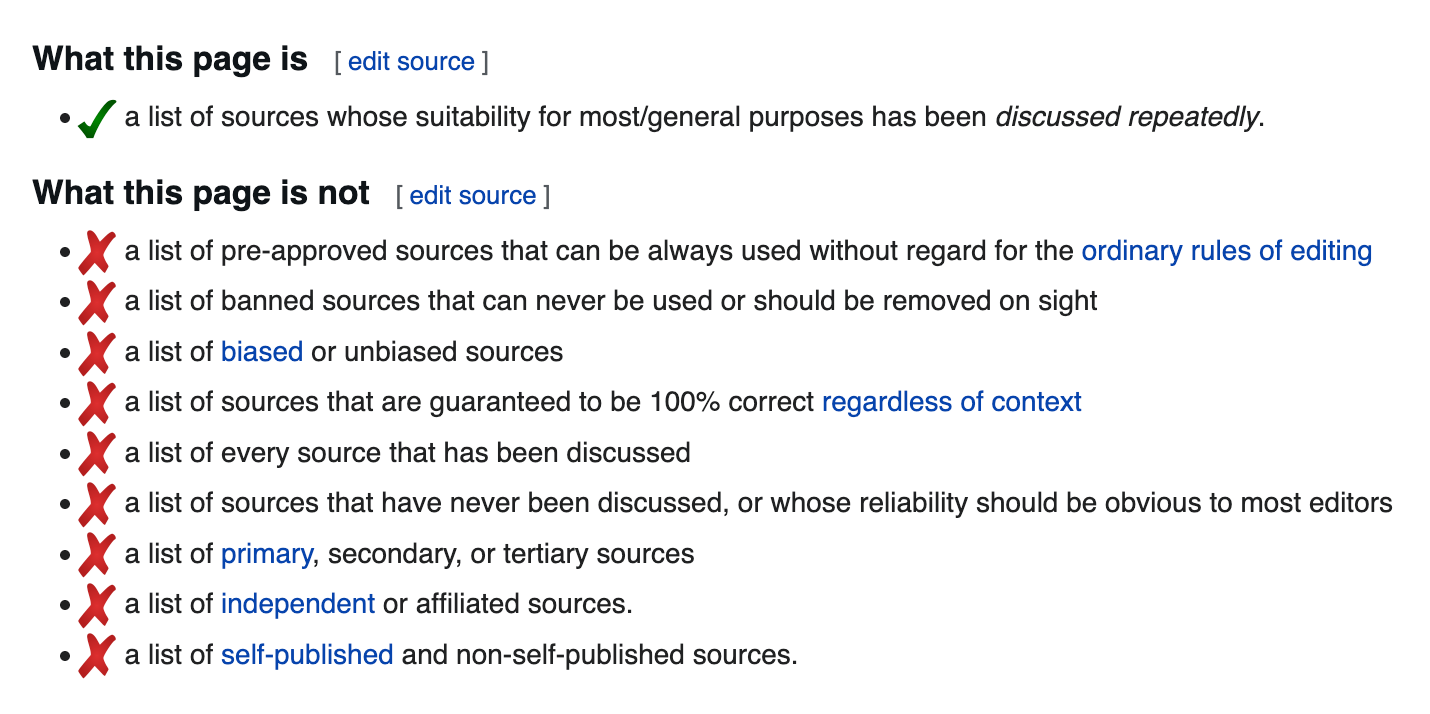
Some sources could perhaps be more accurately described as “banned” on Wikipedia — as in, you can’t even save the page if your edit adds a link to one of these sites — but this is a last resort to prevent abuse. This blocklisting is mostly used to prevent links to sites that are regularly spammed onto Wikipedia (such as crowdfunding or fundraising sites like GoFundMe and Kickstarter), websites containing extremely objectionable material with little encyclopedic merit (such as gore and other shock sites), phishing websites or other scams, and so forth.
With rare exception, when I see right-wing complaints about “banned sources” on Wikipedia, they’re not complaining about blocklisted sources, but rather sources deemed “generally unreliable” or “deprecated”. These decisions aren’t made lightly and are frequently revisited: there have been over fifty discussions about the Daily Mail’s reliability, for example, with both sides being vehemently argued.
There also tends to be a common misconception, or perhaps deception, that only right-leaning sources are labeled unreliable, and only left-leaning sources reliable. While there are more unreliable sources on the list that lean far to the right than to the left, this is a product of the “post-truth” willingness on the right to publish falsehoods that are anywhere from reckless to intentionally fabricated. Organizations like One America News Network, Newsmax, and Project Veritas — all of which have repeatedly published false claims — have made their way onto the list thanks to this predilection. This is not an exclusively right-wing phenomenon — I myself found myself embroiled in long discussions several years ago about whether a very liberal website should be described as “fake news” on Wikipedia (and it is, as of writing) — but it’s far more common on the right.
A mere glance at the perennial sources list is enough to disprove the suggestion that it slices cleanly along right/left lines. Left-wing publications like CounterPunch, the Daily Kos, and Occupy Democrats are in the “unreliable” list. Both right-leaning publications like National Review and Washington Examiner and the left-leaning Media Matters for America, Rolling Stone, and ThinkProgress are labeled “partisan sources”. And right-leaning outlets like The Telegraph, The Hill, Reason, and the Wall Street Journal have earned spots in the “generally reliable” section.
Claims that Wikipedia systematically excludes right-wing viewpoints also ignore how differing viewpoints are handled on the project. When covering controversial topics, Wikipedia editors are expected to describe significant viewpoints in proportion to their prominence in reliable sources — even when those viewpoints are outside the mainstream. For example, Wikipedia's article on climate change includes skeptical positions, but cites them primarily through scientific publications and other reliable coverage rather than through fringe publications or those with poor reputations for fact-checking and scientific rigor. Similarly, articles about electoral fraud claims cite Trump supporters’ perspectives, but through court filings and reliable reporting rather than through sources that have repeatedly published debunked claims. Scratch the surface, and complaints that Wikipedia does not describe these viewpoints at all are often revealed to be complaints that Wikipedia does not adopt these viewpoints as true, or treat widely debunked hypotheses with similar weight as broad scientific consensus.
Personal grievances
While these days Musk frames his crusade against Wikipedia as a principled stand against bias, the timeline of his complaints reveals a more personal motivation. His earliest grievances targeted his own Wikipedia biography, which accurately but much to his chagrin describes him as an “early investor” in Tesla rather than a founder.31h He’s also complained about the Tesla article, which he gripes “glorif[ies]” one of Tesla’s actual founders.32 He has repeatedly claimed his Wikipedia article was written by his “enemies”,3334 and has joined his fans’ complaints about the portion of his Wikipedia page outlining his role in spreading misinformation, bigotry, and conspiracy theories, agreeing with one who suggested “someone paid to have this written”.35 He has boasted so often363738 that he has not tried to “curate” his Wikipedia biography (by which he seems to mean edit it himself, or pay someone to do so on his behalf) that I wonder if he doth protest too much. (As a very highly-watched Wikipedia page, attempts by Musk or his lackeys to insert false or unverifiable portions of the autohagiography he repeats elsewhere would likely meet considerable resistance, as demonstrated by the battles between Musk fanboys — hired or otherwise — and Wikipedia editors that rage in the edit history and talk page.) This grandstanding rings hollow given his track record: when faced with unfavorable coverage elsewhere, Musk has shown no hesitation to exert direct control through legal threats and pressure campaigns.
Only after failing to rewrite his own history on Wikipedia did Musk’s criticism expand to broader complaints, such as Wikipedia’s supposed systemic bias. This crusade gained momentum through several high-profile incidents that became right-wing flashpoints, each fueling his campaign when the site’s coverage didn't match his desired framing. In July 2022, in one of his first tweets complaining about the site beyond where it mentioned him, Musk and others fell for the false statement by Mike Cernovich that “Wikipedia changed the definition of recession to favor the Biden regime, and then locked the page.”39 An article screenshot provided by Cernovich featured text that had remained unchanged since the Trump administration, but that didn’t stop a right-wing firestorm, joined by Musk, where people claimed that Wikipedia had removed the common definition of “recession” as two consecutive quarters of negative economic growth. (It hadn’t).
absolutely begging people to learn how to diff wikipedia articles before falling for clickbait
— Molly White (@molly0xFFF) July 29, 2022
here's the "recession" article, on july 14 vs. today. pic.twitter.com/RgZIwa5scs
After Musk replied to a tweet by Pirate Wires owner Mike Solanai to write “Wikipedia is losing its objectivity”, tagging Jimmy Wales,40 Wales pointed Musk to a note posted to the talk page by frustrated Wikipedia editors dealing with the onslaught of complaints he’d helped to stir up:
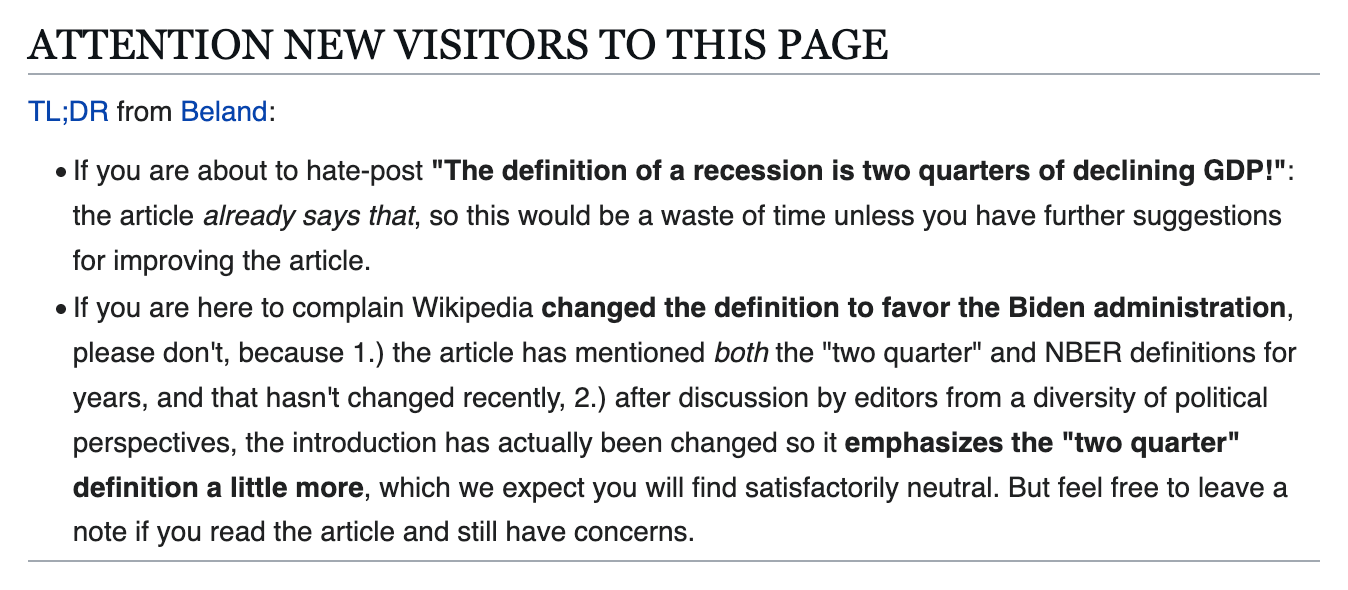
“Reading too much Twitter nonsense is making you stupid,” added Wales. “Call me next week if you want a real discussion.”41
However, even many of his complaints about widespread bias still boil down to disgruntlement at how he personally is covered on the site. Later that year, Musk complained “Wikipedia has a non-trivial left-wing bias”,42 in response to a tweet by Ian Miles Cheong, who observed that there was a deletion discussion underway for the “Twitter Files” article, adding: “These people work hand in hand with the MSM to shape the narrative.” (Anyone can propose a Wikipedia article for deletion, triggering such a discussion. Although deletion discussions normally last seven days, this one was closed early due to overwhelming consensus to keep the article. Neither Cheong nor Musk noted this outcome, and in fact a year later Cheong reposted Musk’s reply to complain, “I still think about this post and how Wikipedia hasn’t improved at all since then. It’s only gotten worse.”43)
Only days after his outrage that the controversy he was trying to stoke might not be covered on Wikipedia, Musk was dismayed when a different controversy — with him at the center — was deemed sufficiently noteworthy for a Wikipedia page. “A two day suspension of maybe 7 accounts for doxxing got an actual Wikipedia page!?” he tweeted,44 referring to a Wikipedia article documenting the unexplained banning of ten journalists who had reported on Musk. Twitter and Musk would later try to retroactively justify the ban with a newly-created rule against sharing real-time flight information such as that posted by the ElonJet Twitter account (and reshared by some of the targeted journalists).
Spending
Some of the ostensible concern about Wikipedia revolves around its spending, though not about the most recent boneheaded claims that Wikipedia is “wasting $50 million” on “DEI” that I’ve already addressed. Amusingly, the question of whether the Wikimedia Foundation’s actual spending is justifiable is arguably Musk’s most reasonable argument, but it’s also one he hasn’t brought up in a long time. “Have you ever wondered why the Wikimedia Foundation wants so much money? It certainly isn’t needed to operate Wikipedia. You can literally fit a copy of the entire text on your phone!j So, what’s the money for? Inquiring minds want to know …”, wrote Musk in October 2023.45
Setting aside why Elon Musk is the one asking this question — the man who says he personally needs a pay package46 of 300–500× the Wikimedia Foundation’s annual budget for the upcoming year47 — Musk betrays the same complete lack of understanding for how software companies work as when he acquired Twitter and claimed it would work just fine if he fired nearly everyone based on absurd evaluations of their productivity (it hasn’t).48 While the cost to simply host a 50-gigabyte stripped-down copy of Wikipedia, or even the hundreds of terabytes of all content across all projects, might be comparatively low, Musk is apparently ignorant to the massive infrastructure costs for running a project like Wikipedia: maintaining and developing MediaWiki (the software that doesn’t just display Wikipedia articles, but also supports its editing interface); hardware, software, and labor costs to keep one of the biggest sites online in the face of high traffic, regular issues, and malicious attacks; costs to provide API access to high-volume consumers (including to train Musk’s own AI endeavors); and so on. Wikimedia infrastructure costs are about 50% of the budget this year, and were around the same percentage during the year Musk, Raichik, and others were complaining about.
Besides infrastructure, other costs go to categories like “equity”, “safety & integrity” (renamed from last year’s “safety & inclusion” — before this whole kerfuffle, I will note), and “effectiveness”. These encompass broader projects around supporting the Wikimedia Movement — the community of volunteer contributors that maintain these huge projects. You might think Musk and his allies would be pleased to hear that a substantial portion of these funds go towards addressing the biases and gaps in coverage — concerns they’ve highlighted. However, although the Wikimedia Foundation and its editing community readily acknowledge biases and gaps in the projects’ content and editor base, they typically have far more to do with underrepresentation of people in the Global South, people of color, and women, than they do with a lack of American right-wingers. Other expenditures go towards fighting disinformation and improving information reliability — again, things Musk and others might support if they were being genuine. Also unmentioned by Musk is Wikimedia’s recent focus on “effectiveness”: that is, on sustainability and maximizing the value of the dollars being spent.
There certainly can be reasonable conversations about whether the Wikimedia Foundation needs to spend $150–$200 million each year. I suspect few have had as detailed conversations about whether there is a need for such spending and fundraising, or about the tone of fundraising emails and banners, or the ultimate purposes of the spending as have Wikimedia’s very own volunteer editing community, which has a rather peculiar and at times adversarial relationship with the Wikimedia Foundation.495051 But “why does Wikipedia need more than the cost to serve a 50GB file” is not one such reasonable conversation. Nor are some of the other talking points that tend to come up in these kinds of conversations (“why does the Wikimedia Foundation pay employees six-figure salaries when they don’t even pay their editors??”k and “why do they need more money when they already have over $270 million??”52l are another two I see a lot). I personally have shared some of the concerns about the magnitude of spending by the Wikimedia Foundation in the past, and have disagreed with some of its allocations — but I’ll also note that I happily contributed money to the Wikimedia Foundation earlier this year, as I have in the past.
The escalating attacks on Wikipedia from Elon Musk and other powerful figures on the American right follow a familiar pattern. First come the claims of bias, supported by cherry-picked or misrepresented examples. Then the demands for “balance”, which in practice mean giving equal weight to fringe views or demonstrably false claims. When these demands are refused, the attacks shift to the platform's legitimacy itself: its funding, its governance, its leaders, and its very right to exist as an independent entity.
We've seen this playbook deployed against traditional media, with Trump labeling unfavorable coverage “fake news” while promoting outlets that parrot his claims. We've seen it in academia, where “viewpoint diversity” is weaponized to demand equal time for climate change denial or historical revisionism. And we've seen it in social media, where Musk himself spent $44 billion to seize control of Twitter after claiming it was biased against conservative views.
Wikipedia’s resilience to these tactics makes it both a model and a target. The very features that Musk and others criticize — its decentralized editing model, rigorous sourcing requirements, and nonprofit status — are what have allowed it to remain one of the internet’s most trusted resources. But these same features make it an obstacle to those who seek to control the narrative.
Wikipedia faces real challenges: its relatively small editing community and difficulties attracting new editors, threats from AI-generated content,m and regulatory proposals that could restrict its functioning or threaten members of its editing community.
But as other information sources fall to acquisition, intimidation, or other pressure, Wikipedia’s stubborn independence becomes more vital than ever. The attacks from Musk and his allies aren't just about an online encyclopedia — they're part of a broader assault on any information source that refuses to be controlled.
Disclosures: I have been contributing to Wikipedia for more than 18 years (as “GorillaWarfare”), and am among the English Wikipedia’s most prolific contributors.53 I volunteer as an editor, administrator, functionary, and have previously served three terms on the site’s Arbitration Committee. While I think this makes me reasonably qualified to speak about Wikimedia-related topics, I should be clear that I do not work for the Wikimedia Foundation (and have never), do not speak on their behalf, and am not (and have never been) compensated for my Wikimedia-related work.n I talk a lot about the Wikipedia articles on Elon Musk and Tesla in this piece; as of publication, I haven’t edited either one (Musk, Tesla).

Footnotes
“DEI” has been a recent addition to “CRT”, “wokeness”, and other dogwhistles used by conservatives and those further to the right to gesture at, and broadly oppose, racial and gender equality.5455 ↩
Rightwingers trying to come up with a slur against Wikipedia should really have considered something that doesn’t so closely overlap with Wookieepedia, a near-homograph that predates the “Wokepedia” coinage by twenty years, which makes me do a double take every time. For those who aren’t familiar, Wookieepedia is the answer to the question: “what if someone was so nerdy that they didn’t just want to contribute to the exhaustive catalogue of Star Wars information on Wikipedia, but they wanted to do so in even greater detail and from an in-universe perspective?” ↩
Carroll has claimed that the US is “controlled by an international criminal organization that grew out of the Jewish mob”, claimed that Israel “did 9/11”, and shared videos purporting to show the existence of a “global Satanic cult … breeding Jewish bloodlines”, among many other things. ↩
While it’s challenging to establish with certainty who exactly operates any given pseudonymous Wikipedia account, the account in question had been making thousands of edits, mostly to do with members of the United Kingdom government. While it’s possible Bill Clinton has a secret editing hobby, or hired someone to do a very half-assed job of scrubbing his page, it’s considerably more likely that the account — later blocked as a prolific sockpuppet that has been active since at least 2022, editing on topics ranging from government officials to pop singers to YouTubers — is just some unrelated person. ↩
Something I imagine would also be unpopular among the portion of the right that has decided academia is not to be trusted. ↩
Amusingly, Sanger’s complaints about the website are well documented in his Wikipedia biography and in Wikipedia’s many articles about criticism of Wikipedia or allegations of ideological bias, which you might think would be impossible if his allegations reflected reality. ↩
We’re really fun at parties. ↩
One of Tesla’s actual founders, Martin Eberhard, sued Musk in 2009 after Musk began claiming responsibility for the company’s earliest accomplishments and disparaging Eberhard. While a confidential settlement earned Musk the right to use the “founder” moniker without fear of future legal action from Eberhard, it did not rewrite history. However, the outcome of the settlement is mentioned in Musk’s Wikipedia biography. ↩
Over the last seven months, Pirate Wires has published at least seven articles condemning Wikipedia, several of which blast the project for publishing “regime propaganda” and repeat the same misrepresentations about the perennial sources list as I describe here. ↩
If you stripped away everything but text, and included only current revisions of articles on the English version of Wikipedia (without other pages, like discussion or user pages), it would amount to 43 gigabytes (24 GB compressed),56 which would fit (albeit as a substantial chunk of the storage space) on many modern smartphones. More complete versions of the project, however, would far exceed the capacity of most smartphones. ↩
Editing Wikipedia for pay is an enormously fraught topic, and the damaging incentives introduced by offering payment for edits at an organizational level would likely be ruinous. ↩
The Wikimedia Foundation tries to keep assets amounting to 12–18 months of expenses in reserve, as is quite reasonable. ↩
Among them: decaying sourcing, the introduction of poor quality LLM-generated content into articles, and the reduced visibility of Wikipedia as people use LLMs trained on the site instead of the site itself. ↩
Unless you count more than a decade ago, when I participated in a MediaWiki-related coding project during college, and received a stipend from Google via their Google Summer of Code program for students. ↩
References
Budget allocations section of the “Wikimedia Foundation Annual Plan/2023-2024/Finances” page. ↩
“Wikimedia Foundation Annual Plan/2023-2024/Goals/Safety & Inclusion” page. ↩
Removal from the “Bill Clinton” article, 18:11 UTC on 22 July 2024. ↩
Addition to the “Bill Clinton sexual assault and misconduct allegations“ article, 18:12 UTC on 22 July 2024. ↩
Addition to the “Post-presidency of Bill Clinton“ article, 18:12 UTC on 22 July 2024. ↩
From the Wikipedia editing guideline on article size: “Very large articles should be split into logically separate articles.” At the time the page was split, the Bill Clinton article was 13,022 words long. According to rough rules of thumb on Wikipedia, articles greater than 9,000 words “Probably should be divided or trimmed, though the scope of a topic can sometimes justify the added reading material.“ At 15,000 words, articles “Almost certainly should be divided or trimmed.“ ↩
Restoration of the section to the “Bill Clinton” article, 06:31 UTC on 12 August 2024. ↩
“Who is End Wokeness?”, Ryan McBeth. (Video). ↩
Tweets by Musk mentioning “wokipedia” or “wokepedia” (he can’t seem to decide on a spelling). ↩
“Musk says ‘cis,’ ‘cisgender’ considered slurs on Twitter”, The Hill. ↩
“Musk tried to ‘punish’ critics, judge rules, in tossing a lawsuit”, The Washington Post. ↩
“Trump campaign defends his remarks about violence toward journalists”, ABC News. ↩
“Jailed reporters, silenced networks: What Trump says he'd do to the media if elected”, NPR. ↩
“Trump’s media lawsuits could do serious damage to America’s free press”, Vox. ↩
“Banned in the USA: Narrating the Crisis”, PEN America. ↩
“Don’t Fall for the Latest Changes to the Dangerous Kids Online Safety Act”, Electronic Frontier Foundation. ↩
“Pornhub Is Now Blocked In Almost All of the U.S. South”, 404 Media. ↩
“F.B.I., Challenging Use of Seal, Gets Back a Primer on the Law”, The New York Times. ↩
Daily Mail RfC, Wikipedia:Reliable sources/Noticeboard/Archive 220. ↩
“Elon Musk’s massive, multibillion-dollar Tesla pay package was blocked by a judge again”, CNN. ↩
“Wikimedia Foundation Annual Plan/2024-2025/Budget Details”. ↩
“You Can’t Code Your Way Out of the Culture Problem”, Slate. ↩
“Wikipedia has cancer”, The Signpost. ↩
“2015–2016 Q1 fundraising update sparks mailing list debate”, The Signpost. ↩
“RfC on the banners for the December 2022 fundraising campaign”, Wikipedia:Village pump (proposals). ↩
Wikimedia Foundation reports/Financial/Audits/2023-2024 - frequently asked questions. ↩
As determined by edit count, though there are certainly flaws with that metric. ↩
“‘What homegrown fascism looks like’: The insidious nature of GOP's not-quite-dog-whistle politics”, Salon. ↩
“‘A Scary Future for Them’: Elon and Pals Turned DEI into Far Right’s New Boogeyman”, Rolling Stone. ↩
Social share image is derived from "Elon Musk Colorado 2022 (cropped2)" (public domain) and the Wikipedia logo (CC BY-SA 3.0, Wikimedia Foundation).
The text of this article is released under the CC BY-SA 4.0 license.


